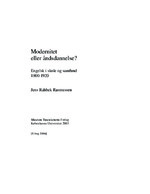Modernitet eller åndsdannelse? (Vol. 339):Engelsk i skole og samfund 1800-1935
Author(s)
Jens Rahbek Rasmussen,
Language
Undetermined[und]Abstract
Today, English is the predominant foreign language in Denmark and it is so widely spread that many people are concerned for the Danish language. But this is a recent development. As late as a hundred years ago, one could pass one's A-levels without ever having read a single word of English, and even students of the science side were taught more Latin than students of the Classical languages are today. It was the school reforms in 1903 that broke away from the grammar school and gave the modern languages a key position in both the primary, lower secondary and upper secondary schools. From having been scorned as a language of commerce, English was now recognized as a valid cultural language. The book outlines this development and discusses questions, such as: Why did it take so long for the English language to become part of the general education? What connected the Danish political-cultural orientation after 1964 and the development of the language subjects in the schools? Why was the
school of Modern languages successful at first when later, in the 1930s, it came up against an identity crisis?
The book provides a historical perspective for the topical debate in the upper secondary schools and proves that many of the arguments in this debate have been heard before.
Keywords
gymnasieskolen; 20th century; dansk; uddannelse; cultural education; primary school; 19. årh.; 20. årh.; lærdoms- og uddannelseshistorie; grammar school; history of education and history of learning; dannelse; danmark; denmark; danish; 19th century; education; folkeskolenDOI
10.26530/OAPEN_342364ISBN
9788772898681OCN
808382642Publisher
Museum Tusculanum PressPublisher website
https://www.mtp.dk/Default.asp?Publication date and place
2006Series
Studier fra Sprog- og Oldtidsforskning,Classification
History


 Download
Download